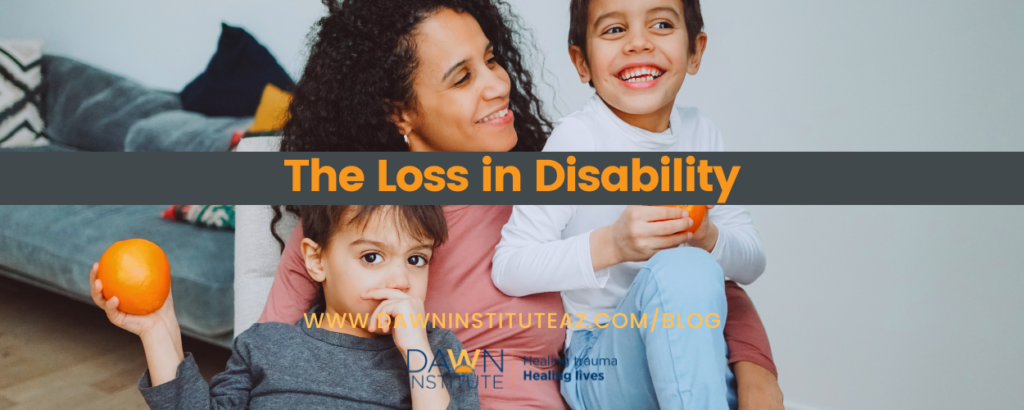Disability is something that most people don’t think will happen in their life.
Still, the disability community is the largest minority in society today with one in four individuals born with or acquiring a disability at some point over their lifetime.
With this commonality comes a shared difficult experience of coping with disability, which is often unexpected. There is a unique grief and loss which accompanies disability that is difficult for others outside the experience to understand. This experience is called “ambiguous loss.”
My Story
At twenty-three my mind was as far from disability as it could possibly be. I was young, healthy, and enjoying my life as a young wife and mother to a delightful one-year-old. I was thrilled when I found out that I was expecting another baby! As happens with most excited expecting mothers, I started to dream about what my baby and life as a mother of two would look like. Hopes and dreams for the future developed in my mind and I eagerly anticipated discovering the sex of my new baby.
Being an incredibly impatient mother, I decided to take a prenatal blood test designed to detect genetic abnormalities. There was no concern in my mind as to the health of my expected baby, but the attached allure of discovering my baby’s sex seven weeks early was appealing. What I was not prepared for was a phone call that would change the trajectory of my life.
The moment of my son’s diagnosis is a flashbulb memory forever imprinted in my mind. My daughter had just laid down for a nap when my phone rang. I was excited to see that it was my midwife’s number as I was eagerly awaiting my test results.
On the other end of the line, she told me that my results had come back and that my baby had a high likelihood of trisomy 21: Down syndrome. She knew that I had been awaiting the sex of my baby and offered to email the results over so that my husband and I could discover the sex together when we were ready. She offered to talk when I needed to, and I hung up the phone.
The Loss
The feeling of unreality was intense. I could not believe what I had just heard. My child likely had Down syndrome, a diagnosis I knew to be paired with significant global developmental delays, numerous health problems, and intellectual disability.
I sat in disbelief until the panic increased to an unmanageable level, and I frantically ran into my daughter’s nursery seeking physical comfort. My one-year-old had just woken up, so I rocked her in my rocking chair and sobbed. I’m not sure how long I was there, but that is the position in which my husband found me.
I was barely able to convey the news to him that I had just received. We looked at the results together. Directly under a “97% chance” that our baby had Down syndrome was the gender. We were having a boy: the baby we were hoping for.
The Pain
I lay in a ball on my floor and cried until I was sick. The depth of my sorrow, anger, disbelief, and hopelessness was too great for me to hold. I found myself telling my husband, “I was hoping for a boy, but this is not the child I wanted.”
Over the next few days my emotions became more complicated as different layers surfaced. I felt shackled to a new life with a child I didn’t want. This child would likely live with my husband and I for the rest of our life together. My son would possibly never go to college. My son would require intensive amounts of energy to parent, advocate for, and coordinate medical/therapeutic care. Not to mention the financial cost associated with those needed care services. My son would likely never be a parent.
I began to realize that so many dreams that I had developed for my son had died with the diagnosis.
Finally, I was able to voice that I felt as though my child had died, and yet my child was still living. It was not until much later that I was able to realize that in a way my child had died. The child I had envisioned and dreamt of would never be a part of my life.
The Healing
I have since had my child and done my own therapeutic and academic work. I have discovered that this experience of perceived loss of an anticipated child or dream can be referred to as “ambiguous loss.” For me, and for many others, disability diagnoses for oneself or a loved one can be accompanied by many intangible losses. They can be difficult to describe and difficult for others to understand as sometimes the thing that was lost, like dreams for example, were never really real. It is the loss of prospective reality, future hopes, and possibilities which can cause immense pain in these instances.
There is much joy in my life with my son; I wouldn’t trade it for anything!
But that is a much longer story of newfound, unexpected blessing for another time. Still, I experience ambiguous loss on my journey in this life I never really wanted. But the pain is less, and I have tools which I can use to help me cope when my grief rears its ugly head and threatens to steal my joy.
It is a great desire of mine to come alongside others who are walking through similar emotional experiences connected to disabilities. If you are interested in learning more about ambiguous loss and ways to cope with this unique grief, sign up for one of my trainings through Dawn Institute this week.

